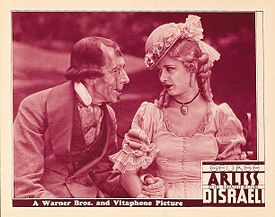Disraeli (1929 film)
| Disraeli | |
|---|---|

lobby card
|
|
| Directed by | Alfred E. Green |
| Screenplay by | Julien Josephson |
| Starring |
George Arliss Doris Lloyd David Torrence Joan Bennett |
| Cinematography | Lee Garmes |
|
Production
company |
|
| Distributed by | Warner Bros. |
|
Release date
|
November 1, 1929 |
|
Running time
|
90 minutes (1929 release) 87 minutes (1934 re-release) |
| Country | United States |
| Language | English |
Disraeli is a 1929 American historical film directed by Alfred E. Green, released by Warner Bros. Pictures, Inc., and adapted by Julien Josephson and De Leon Anthony from the 1911 play Disraeli by Louis N. Parker.
The lobby card states, "Mr. George Arliss in his greatest picture Disraeli". His performance as British Prime Minister Benjamin Disraeli won him the Academy Award for Best Actor in a Leading Role. The story revolves around the British plan to buy the Suez Canal and the efforts of two spies to stop it.
As with the original 1911 Broadway play and its 1917 revival, and the 1921 silent film, Arliss' wife Florence appeared opposite him in the role of Disraeli's wife, Mary Anne (Lady Beaconsfield).
In 1874, Disraeli's ambitious foreign policy, aimed at creating a British empire, is voted down by the House of Commons after a speech by his great rival, William Gladstone. Later, Disraeli receives the welcome news that the spendthrift Khedive of Egypt is in dire need of money and is willing to sell the controlling shares in the Suez Canal. The purchase of the canal would secure control of India, but Michael Probert, head of the Bank of England, makes it clear to Disraeli that he is vehemently opposed to any such plan. Disraeli then summons Hugh Myers, a leading Jewish banker.
Meanwhile, Lord Charles Deeford proposes to Lady Clarissa Pevensey. Although she is in love with him, she turns him down. He is content to enjoy his wealth and high social standing, and lacks the ambition she wants in a husband; further, she is a great admirer of the Prime Minister and Charles has no strong opinion about him. Disraeli, seeing promise in the young man and wanting Clarissa to be happy, convinces Charles to come work for him, and tells him about the canal purchase.
...
Wikipedia
